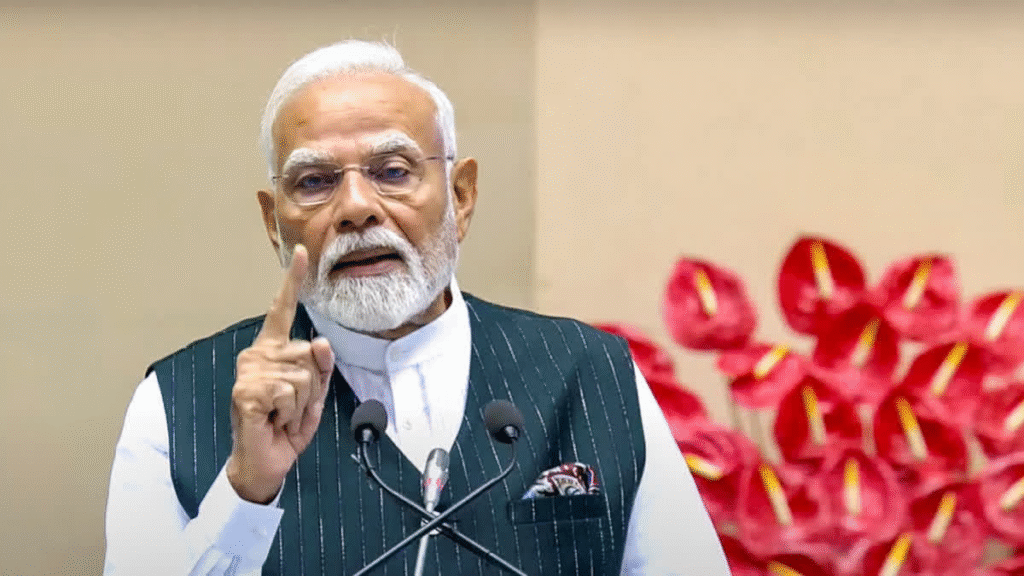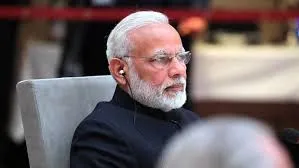
In recent times, the relationship between India and Pakistan has once again reached a critical juncture. The catalyst this time is a forthright speech by Prime Minister Narendra Modi addressing two deeply sensitive and intertwined issues—cross-border terrorism and the Indus water dispute. Modi’s candid remarks have sent shockwaves across diplomatic circles, with Pakistan responding sharply, accusing India of playing the “victim card” to justify aggressive policies. This blog provides an exhaustive account of Modi’s statements, the historical and political contexts behind the controversies, the intricate dynamics of the Indus Waters Treaty, Pakistan’s reactions, and what the future holds for these two nuclear-armed neighbors.
Modi’s Direct Confrontation on Terrorism and Water Rights
Prime Minister Narendra Modi’s speech was nothing short of a strategic declaration. Speaking with uncharacteristic directness, Modi highlighted how terrorism emanating from Pakistani territory continues to destabilize India’s peace and security. He stressed that India would no longer tolerate these attacks and would take all necessary measures to safeguard its citizens and sovereignty.
Equally significant was Modi’s address on the Indus water dispute, a topic that has simmered quietly beneath decades of political tension. Modi made it clear that India is prepared to take a tougher stance on water sharing under the Indus Waters Treaty, a 1960 agreement mediated by the World Bank that has governed water distribution between the two countries for over six decades. Modi’s speech implied that India will prioritize its water security, especially in regions heavily dependent on river waters, signaling a shift from India’s traditionally cautious approach to the treaty.
Historical Context: Terrorism and the Indus Waters Treaty
To fully grasp the gravity of Modi’s statements, it is essential to revisit the history of both terrorism and water sharing between India and Pakistan.
Terrorism, particularly in Jammu and Kashmir, has long been a point of contention. Since the partition of British India in 1947, the Kashmir conflict has fueled several wars and countless skirmishes. Pakistan-backed militant groups have orchestrated numerous attacks inside India, targeting civilians, security forces, and infrastructure. These attacks have hardened India’s approach, especially under Modi’s government, which has sought to dismantle terror networks through a combination of military action and diplomatic pressure.
The Indus Waters Treaty, signed in 1960, was considered a remarkable achievement for its time, demonstrating cooperation despite political hostility. The treaty allocated the three “eastern” rivers (Ravi, Beas, and Sutlej) to India and the three “western” rivers (Indus, Jhelum, and Chenab) to Pakistan. However, as India’s water needs have grown and new projects on western rivers have been initiated, Pakistan has raised concerns about potential violations, alleging that India’s dams and hydroelectric projects reduce the flow downstream.
Modi’s speech reflects these cumulative tensions—India’s frustration with Pakistan’s alleged support for terrorism and the increasing importance of water security in a climate-threatened era.
Operation Sindoor and India’s Intensified Counterterrorism Strategy
Among the most critical revelations in Modi’s address was the mention of “Operation Sindoor,” a code name symbolizing India’s renewed and robust counterterrorism strategy. This operation is not simply about retaliatory strikes but represents a comprehensive campaign to identify, disrupt, and dismantle terrorist networks based inside Pakistan and supported by its agencies.
The operation’s objectives are multifaceted—neutralizing terror camps, intercepting arms and funds, and preventing infiltration attempts across the Line of Control (LoC). Modi’s government has prioritized intelligence-led operations and increased cooperation between security forces and local populations in border areas.
“Operation Sindoor” is emblematic of Modi’s broader security doctrine, which refuses to accept terrorism as a chronic, unavoidable problem. Instead, it advocates a proactive posture aimed at preventing attacks before they materialize. This assertive approach marks a departure from previous Indian governments that sometimes opted for diplomatic restraint or compartmentalization of the Kashmir issue.
The Indus Waters Treaty Under Strain: Modi’s Position
The Indus Waters Treaty is often hailed as a rare example of Indo-Pak cooperation amidst decades of conflict. However, Modi’s speech has highlighted its vulnerabilities in the current geopolitical landscape.
India’s growing demand for water, exacerbated by rapid urbanization, agricultural expansion, and climate change, has necessitated new water projects. The government has sanctioned hydroelectric plants and dams on western rivers, projects that Pakistan claims contravene the treaty.
Modi’s tone suggested that India will not be deterred by Pakistan’s protests and that the treaty should not be used as a shield to continue supporting terrorism. This link between water and security is significant, as it implies that India might consider leveraging the treaty’s provisions or related water resources as part of its broader strategic response.
For Pakistan, this is a deeply unsettling prospect. The Indus river system supports roughly 90% of Pakistan’s agricultural output, and any disruption could have devastating effects on food security and the economy. Thus, Modi’s remarks have raised fears in Islamabad of an impending water crisis triggered or exacerbated by India’s assertive water policies.
Pakistan’s Reaction: Defensive Narratives and Strategic Posturing
Pakistan’s response to Modi’s speech was swift and defiant. Pakistani leaders and media accused India of “playing the victim card” to justify its aggressive policies. Islamabad’s narrative portrays India as using terrorism and water issues to gain international sympathy while ignoring Pakistan’s legitimate concerns and regional challenges.
The “victim card” accusation reflects Pakistan’s attempt to frame itself as unfairly targeted and pressured by a more powerful neighbor. Islamabad insists it remains committed to peace and accuses India of using heavy-handed tactics to intimidate Pakistan.
However, this narrative does not account for Pakistan’s documented history of sponsoring and harboring terrorist groups that operate against India. The international community’s growing recognition of Pakistan’s role in cross-border terrorism has weakened its diplomatic stance, leading to increased isolation in certain forums.
The Geopolitical Ramifications: Regional and Global Perspectives
Modi’s speech and the resulting Pakistan backlash must be understood within the larger geopolitical context of South Asia and beyond. The India-Pakistan rivalry is a fulcrum on which the region’s stability balances.
Globally, countries such as the United States, China, Russia, and the European Union watch closely. The U.S. has traditionally pushed for dialogue and peaceful resolution, while China maintains strategic ties with Pakistan. Russia has expanded ties with India but also advocates for stability in the region.
Modi’s unequivocal stance signals India’s desire to assert itself as a regional power capable of shaping its destiny and challenging the status quo. This posture challenges Pakistan’s strategic calculus and complicates the interests of external powers.
The water issue, in particular, has implications beyond bilateral relations. As climate change intensifies water scarcity globally, the Indus river basin becomes a microcosm of the challenges facing transboundary water management worldwide. How India and Pakistan navigate this will influence regional security and cooperation models.
The Human Dimension: Impact on People and Communities
While political leaders debate terrorism and treaties, millions of people on both sides live the consequences. Communities in Kashmir and along the border face violence, instability, and uncertainty. Farmers reliant on Indus waters confront the threat of drought, impacting food production and livelihoods.
Modi’s speech, while strategic, also resonates on a human level—addressing citizens’ concerns about safety, development, and resource availability. His government’s firm approach aims to reassure Indian citizens of the state’s commitment to their protection and prosperity.
However, this approach risks escalating tensions and inadvertently impacting innocent civilians caught in the crossfire. Diplomatic efforts must balance security imperatives with humanitarian considerations.
The Historical Evolution of Indo-Pak Relations: From Partition to Present
Understanding Modi’s speech also requires reflection on the tumultuous history between India and Pakistan. The partition of British India in 1947 created two nations but left unresolved issues, notably Kashmir.
Since then, four wars, numerous skirmishes, and decades of hostility have marked their relationship. Peace efforts, including the Shimla Agreement (1972), the Lahore Declaration (1999), and the Agra Summit (2001), have occasionally offered hope but often faltered amid mistrust and violence.
Terrorism became a defining issue post-1989, with Pakistan’s alleged support for insurgent groups in Kashmir. The 2008 Mumbai attacks further soured relations. Modi’s rise to power in 2014 brought a new assertiveness, including revoking Jammu and Kashmir’s special status in 2019, which drew sharp Pakistani condemnation.
The Indus Waters Treaty, meanwhile, has been a rare constant but increasingly tested by political and environmental pressures.
The Legal and Environmental Dimensions of the Indus Waters Dispute
The treaty’s legal framework allows India to use the western rivers for non-consumptive purposes like hydroelectric power, but Pakistan claims some Indian projects violate the treaty’s spirit and technical parameters.
Environmental concerns, including climate change, glacial melt, and water pollution, complicate the issue. Both countries face the challenge of managing a shared resource in a way that ensures sustainability and equitable access.
Experts suggest modernizing the treaty to include provisions for climate change adaptation, data sharing, and joint management. Modi’s speech may open space for such discussions, albeit amid heightened tensions.
Diplomacy and Dialogue: Prospects for Peace and Cooperation
Despite current strains, dialogue remains crucial. Track II diplomacy, confidence-building measures, and third-party mediation have potential to reduce tensions.
India has emphasized that peace depends on Pakistan ceasing support for terrorism. Pakistan calls for respect for its water rights and peaceful coexistence.
The international community can play a facilitating role, but ultimately, political will from both sides will determine outcomes.
Looking Forward: Challenges and Opportunities in Indo-Pak Relations
The Modi-Pakistan episode reflects larger trends: India’s growing global assertiveness, Pakistan’s strategic recalibrations, and the region’s environmental vulnerabilities.
Challenges include mistrust, security dilemmas, and resource conflicts. Opportunities lie in mutual benefits from cooperation—peace, economic growth, and environmental sustainability.
The coming years will test leadership, public opinion, and resilience on both sides.
Conclusion: A Defining Moment in South Asian Geopolitics
Prime Minister Narendra Modi’s forthright speech on terrorism and the Indus water dispute represents a defining moment in Indo-Pak relations. By addressing these issues simultaneously, Modi has highlighted the intertwined nature of security and resource management.
Pakistan’s strong reaction underscores the fragility of the relationship and the challenges ahead. While the rhetoric may harden, the path forward requires balancing national interests with the urgent need for peace and cooperation.
The subcontinent’s future hinges on whether these two nations can transcend historical grievances and embrace pragmatic solutions. Modi’s speech is a bold declaration of India’s resolve but also a call to Pakistan to reconsider its policies for the sake of regional stability.
As the world watches, the Indo-Pak saga continues, a complex narrative of conflict, coexistence, and the quest for a peaceful future.

